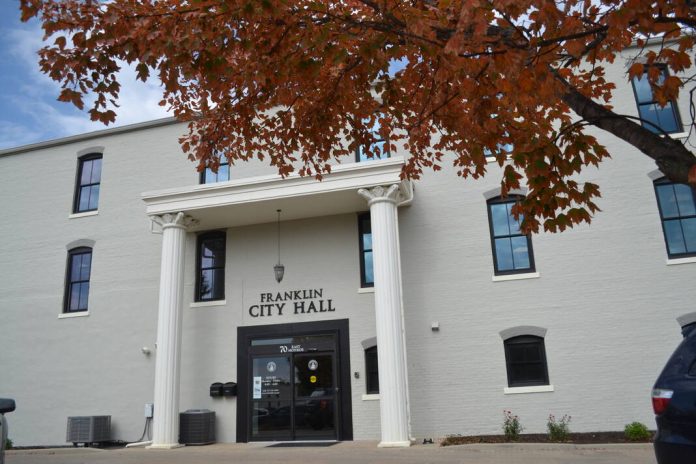Franklin College and the city are considering collaborating for a unique approach to development.
The request is to consider establishing a Certified Tech Park, or CTP. Stephen Akard, a partner in the Bose McKinney & Evans Site Selection and Economic Incentives Group, presented the concept to the Franklin Redevelopment Commission on Tuesday to open a discussion regarding the potential benefits of this “little used, not quite as well-known incentive tool.”
“We represent Franklin College with respect to an expansion project that is under consideration to the east of the campus,” Akard said. “They asked us to look at alternative support options from the state government that might be appropriate for the project.”
Akard said that they spoke with the Indiana Economic Development Corporation about utilizing a CTP as a potential tool for the institution, something that hasn’t been used for years in Indiana, he said.
The CTP would be used to develop about 40 acres off of East Greensburg Road and approximately 30 acres off of Umbarger Lane. This is the same land that Franklin College is looking to develop with Lilly Endowment’s College and Community Collaboration grant. The college is still in the process of applying for the grant, which would potentially be used to develop multi-family housing, industrial buildings and a new building for the college itself, according to early plans presented to the Franklin Technical Review Committee.
The grant offers “interested Indiana colleges and universities the opportunity to apply for grants to help them envision and undertake collaborative projects with community stakeholders that enhance the quality of life and place in their surrounding communities,” according to the endowment’s website.
Lilly Endowment has allocated $300 million to be awarded and several grants have already been allocated to Indiana institutions. Franklin College officials expect to learn if they will receive the grant this summer.
What are Certified Tech Parks
CTPs were established by the General Assembly in 2003 and are designated areas aimed at developing high-tech jobs and activities. Indiana currently has 22 of these established parks, but none are located in Johnson County, Akard said.
These parks operate under strict criteria including “significant support” from a higher education institution like Franklin College and are put into place by local redevelopment commissions. To establish a CTP, they must operate under a business plan for high-tech activities and require a business incubator space, he said.
With the support of an institution like Franklin College, space could be created within a geographic district where companies could employ people in a high-tech incubator space and partner with other companies that are nearby while using resources from the college, Akard said.
The benefit of CTPs is that they can capture incremental tax growth, specifically wage withholding and retail sales, within the specified geographic district, he said. Captured dollars have a maximum cap of $5 million over the park’s lifetime and come with a potential annual allocation of $250,000 if certification is maintained. Certifications for CTPs last four years and can be recertified.
Akard emphasized that CTPs are relatively underutilized in the state. He described them as a “predecessor concept” to what are now Innovation Development Districts.
He said that it was recommended that Franklin College and the city jointly consider this concept.
Franklin’s potential CTP
The proposed CTP location would be to the east of Franklin College with the primary access points on Umbarger Lane and East Greensburg Road, Akard said.
“It is mostly open land,” he said. “The project that is envisioned would be in a couple (of) phases. The first would be the development of about 20 to 30 acres and ultimately could be up to about 200 acres there.”
The secondary phase of the project includes the potential development of multi-family residential housing adjacent to the commercial side of the CTP, Akard said.
CTPs are conceptually similar to TIF districts, but instead, it takes a tax revenue stream that goes to the state and redirects it back to the “locality,” Akard said.
“TIF would normally be based on property tax increment and would be sort of a mortgage of a future stream, while this is based on actual performance,” he said. “So as there would be increases in jobs and wage withholdings, we would get a portion of that back.”
Mayor Steve Barnett said city officials are interested in this concept but need more information before making a decision. He has asked planning and economic development staff to investigate how much it would benefit the city to join the college for this venture and what, if anything, it would cost taxpayers.
The ultimate makeup of the development would be determined by Franklin College and the market, he said.
“The housing part of it would be a private investment,” Barnett said. “The only thing that the city would be interested in would be the economic development part of the tech park itself.”
A more detailed plan for the CTP is expected to be ready to present by June, with a potential resolution appearing before the redevelopment commission by late summer.





